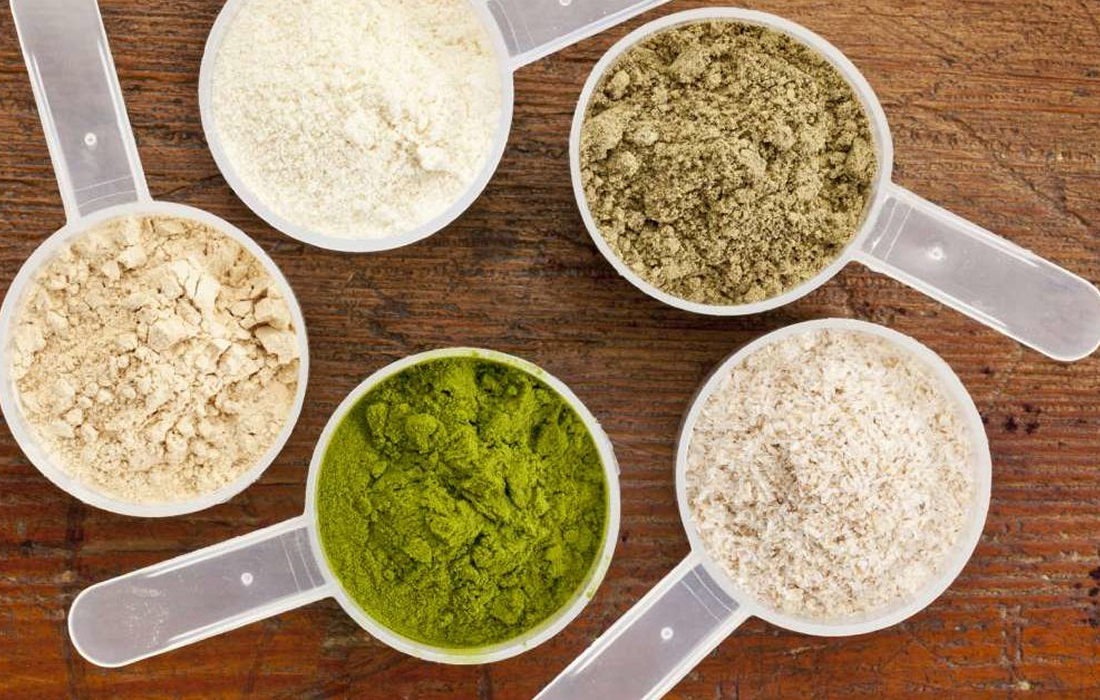Nutrition and Supplements
What Supplements Help with Muscle Growth?
If you exercise regularly, you likely want to be sure you’re getting the most out of it. One important benefit from exercise is gaining muscle and strength. Having a healthy amount of muscle allows you to perform your best during exercise and daily life. Three main criteria must be met for maximal muscle gain: eating more calories than you burn, consuming more protein than you break down and an exercise program that is challenging to your muscles.
While it’s possible to meet all these criteria without taking dietary supplements, certain supplements may help you meet your goals. Some of these supplements are listed below based on what research says.
Creatine
Creatine is one of the most popular nutritional ergogenic aids for athletes. Studies have consistently shown that creatine supplementation increases intramuscular creatine concentrations which may help explain the observed improvements in high intensity exercise performance leading to greater training adaptations.
In addition to athletic and exercise improvement, research has shown that creatine supplementation may enhance post-exercise recovery, injury prevention, thermoregulation, rehabilitation, and concussion and/or spinal cord neuroprotection.
Creatine is a molecule that is produced naturally in your body. It provides energy for your muscles and other tissues. However, taking it as a dietary supplement can increase muscle creatine content by up to 40% beyond its normal levels. This affects your muscle cells and exercise performance, promoting muscle gain. In fact, a large amount of research shows creatine improves muscle strength. Greater strength allows you to perform better during exercise leading to larger increases in muscle mass over time.
Creatine can also increase water content in your muscle cells. This may cause your muscle cells to swell slightly and produce signals for muscle growth. Furthermore, this supplement may increase levels of the hormones involved in muscle growth, such as IGF- and can also decrease breakdown of proteins in your muscles.
Studies have also found that creatine can increase the activity of satellite cells (muscle stem cells) in the muscle causing an increase in both activity and number of them, leading to an increase in muscle mass.
Protein Supplements
Protein powder is a popular nutritional supplement. Protein is an essential macronutrient that helps build muscle, repair tissue, and make enzymes and hormones. Using protein powder may also aid weight loss and help people tone their muscles.
Protein is one of the building blocks of bone, muscle and skin. The body needs it to produce hormones, enzymes and other chemicals.
The possible health benefits of protein powders include the following:
- Muscle growth: Protein is essential for muscle growth. Many athletes and gym enthusiasts consume protein shakes because they believe that these drinks will help them bulk up after strength training. A 2018 analysis of 49 studies supports the use of protein supplementation for this purpose. The research suggests that protein supplements significantly improve muscle size and strength in healthy adults who perform resistance exercise training such as lifting weights.
Protein supplementation was equally effective in men and women. However, the effectiveness may decrease with age as older adults have higher protein requirements than younger people. The researchers also noted that once protein exceeded 1.6 grams (g) per kilogram (kg) of body weight (or 0.73 g per pound (lb) of body weight), the participants did not experience any additional benefits. - Recovery after exercise: As well as contributing to muscle growth, protein can help repair damaged muscles and tissues. As a result, athletes may use protein powder to speed up recovery from muscle soreness after exercise. Many studies report that taking protein supplements after exercise can aid recovery by reducing muscle damage and improving muscle performance and muscle protein synthesis.
- Weight management: Eating protein-rich foods and taking supplements may help people feel fuller for longer. Feeling full tends to result in smaller portion sizes and less frequent snacking, which can help a person maintain a healthy weight or lose weight if necessary. A 2017 review reported that supplementing with whey protein might reduce body weight and total fat mass in people who are overweight or obese. It may also reduce blood pressure, total cholesterol and other risk factors for cardiovascular diseases.
Beta-Alanine
Beta-alanine is an amino acid that reduces fatigue and may increase exercise performance. Additionally, beta-alanine may help increase muscle mass if you are following an exercise program.
One study showed that taking 4 grams of beta-alanine per day for eight weeks increased lean body mass more than a placebo in college wrestlers and football players.
Another study reported that adding a beta-alanine supplement to a six-week, high-intensity interval training program increased lean body mass by about 1 pound (0.45 kg) more than a placebo. While more research on beta-alanine and muscle gain is needed, this supplement may help support muscle gain when combined with an exercise program.
Conclusions
Supplements can’t provide you with maximal muscle gains if your nutrition and exercise programs are lacking. To gain muscle, you need to eat enough calories and protein as well as exercise, ideally with weights.
Once your nutrition and exercise regimens are in check, you may consider dietary supplements so you can achieve your goals and become a better and healthier version of yourself. You can ask one of our team members about our nutrition and supplementation program. And remember that:
“The struggle you’re in today is developing the strength you need for tomorrow.”
Source:
Olsen S, Aagaard P, Kadi F, et al. Creatine supplementation augments the increase in satellite cell and myonuclei number in human skeletal muscle induced by strength training [published correction appears in J Physiol. 2006 Sep 15;575(Pt 3):971]. J Physiol. 2006;573(Pt 2):525-534. doi:10.1113/jphysiol.2006.107359.
Kreider RB, et al. International Society of Sports Nutrition position stand: safety and efficacy of creatine supplementation in exercise, sport, and medicine. J Int Soc Sports Nutr. 2017 Jun 13;14:18. doi: 10.1186/s12970-017-0173-z. PMID: 28615996; PMCID: PMC5469049.
https://www.healthline.com/nutrition/supplements-for-muscle-gain#TOC_TITLE_HDR_2
https://www.medicalnewstoday.com/articles/323093#_noHeaderPrefixedContent

